Huntsman Surname Ancestry ResultsOur indexes 1845-1865 include entries for the spelling 'huntsman'. In the period you have requested, we have the following 14 records (displaying 1 to 10): Buy all | | | Get all 14 records to view, to save and print for £70.00 |
These sample scans are from the original record. You will get scans of the full pages or articles where the surname you searched for has been found. Your web browser may prevent the sample windows from opening; in this case please change your browser settings to allow pop-up windows from this site. Electors for Attercliffe-cum-Darnall
(1848)
On 14 and 15 December 1848 an election took place for a Knight of the Shire for the West Riding of Yorkshire in the House of Commons. The candidates were Edmund Denison and sir Culling Eardley Eardley, gaining 14,743 and 11,795 votes respectively. The county franchise at this period included freeholders of land worth 40s or more a year; £10 copyholders and long-leaseholders; and £50 short-leaseholders and tenants. This poll book was published in 1849.
Former poll books had been compiled from the sheriff's returns; but as these were now transmitted to the Home Office immediately after an election, in this instance the polling was marked from the check-clerk's returns, carefully compared with the registers marked in the poll booths at the time of voting.
The votes for the respective candidates are indicated by the numerals 1 (Denison) and 2 (Eardley). The omission of these numerals indicates that the elector did not vote. Many names which appear on the register of particular townships are completely omitted in this poll book: in all these cases, the same name will be found recorded in some other township, the elector having two or more qualifications. In such cases, his name only appears in the poll book in the actual township for which he chose to vote; or, if he did not vote at all, in that township for which he was qualified that lay closest to his actual residence.
The townships are arranged alphabetically within polling district; and within each township the names are arranged alphabetically by surname and christian name, and the elector's residence is given. Many of the electors resided outside the township for which they were qualified - some in other counties. Moreover, at the end of each polling district there is a list of persons registered to poll in that district, from townships is other districts. HUNTSMAN. Cost: £4.00.  | Sample scan, click to enlarge
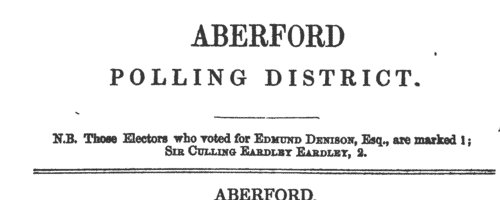
| Electors for Brightside Bierlow
(1848)
On 14 and 15 December 1848 an election took place for a Knight of the Shire for the West Riding of Yorkshire in the House of Commons. The candidates were Edmund Denison and sir Culling Eardley Eardley, gaining 14,743 and 11,795 votes respectively. The county franchise at this period included freeholders of land worth 40s or more a year; £10 copyholders and long-leaseholders; and £50 short-leaseholders and tenants. This poll book was published in 1849.
Former poll books had been compiled from the sheriff's returns; but as these were now transmitted to the Home Office immediately after an election, in this instance the polling was marked from the check-clerk's returns, carefully compared with the registers marked in the poll booths at the time of voting.
The votes for the respective candidates are indicated by the numerals 1 (Denison) and 2 (Eardley). The omission of these numerals indicates that the elector did not vote. Many names which appear on the register of particular townships are completely omitted in this poll book: in all these cases, the same name will be found recorded in some other township, the elector having two or more qualifications. In such cases, his name only appears in the poll book in the actual township for which he chose to vote; or, if he did not vote at all, in that township for which he was qualified that lay closest to his actual residence.
The townships are arranged alphabetically within polling district; and within each township the names are arranged alphabetically by surname and christian name, and the elector's residence is given. Many of the electors resided outside the township for which they were qualified - some in other counties. Moreover, at the end of each polling district there is a list of persons registered to poll in that district, from townships is other districts. HUNTSMAN. Cost: £4.00.  | Sample scan, click to enlarge
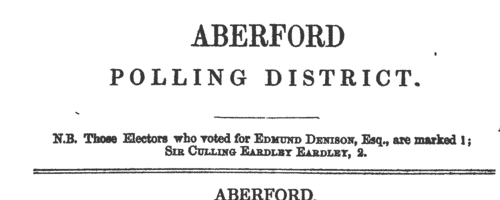
| Deaths, Marriages, News and Promotions
(1850)
Death notices and obituaries, marriage and birth notices, civil and military promotions, clerical preferments and domestic occurrences, as reported in the Gentleman's Magazine. Mostly from England and Wales, but items from Ireland, Scotland and abroad.
HUNTSMAN. Cost: £4.00.  | Sample scan, click to enlarge

| London Missionary Contributions: Craven Chapel
(1850)
The monthly Missionary Magazine and Chronicle listed contributions to the London Missionary Society received from individuals and through the auxiliaries. The issues for 1850 covered contributions received from 1 November 1849 to 31 October 1850.HUNTSMAN. Cost: £6.00.  | Sample scan, click to enlarge
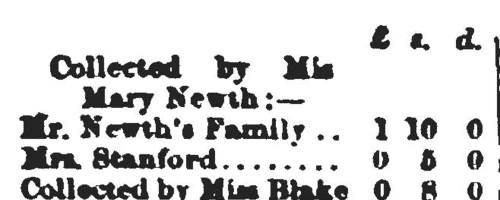
|  Criminal lunatics in Surrey
(1851) Criminal lunatics in Surrey
(1851)
The 1851 census return for the Royal Hospital of Bethlehem or Bethlem, founded by Edward VI for the cure of poor lunatics. The hospital lay in the parish of St George the Martyr, Southwark, in St Jude ecclesiastical district. The return of patients was divided into three sections: curable, incurable and criminal lunatics. This index covers the criminal.HUNTSMAN. Cost: £4.00.  | Sample scan, click to enlarge

| Traders and professionals in London
(1851)
The Post Office London Directory for 1851 includes this 'Commercial and Professional Directory', recording about 80,000 individuals. HUNTSMAN. Cost: £4.00.  | Sample scan, click to enlarge

| Dissolutions of Partnerships
(1852)
Trade partnerships dissolved, or the removal of one partner from a partnership of several traders, in England and Wales
HUNTSMAN. Cost: £6.00.  | Sample scan, click to enlarge

| Mathematics students at Cambridge University
(1852)
Tripos lists or examination results for the year, arranged by class (Wranglers, Senior Optimes and Junior Optimes), and within each class in order of score in the examination (the names of candidates with equal scores are bracketed together, with the word 'AEq.'). Each student's surname and college is given: this list was printed in 1890, and was annotated with asterisks to show which students had subsequently become fellows of the university; and with footnotes showing those who became headmasters, &c., elsewhere. Winners of Dr Smith's Mathematical Prizes are marked (1) senior, (2) for junior. The Greek letter alpha is affixed to the names of those students who had gained first class results in the Classical Tripos; beta to those entered in the second class; and gamma to those entered in the third class. These lists are particularly useful in identifying for an individual the fellow-students who will have attended lectures with him; and, where from the college, are likely to have been even more closely associated by having been under the same supervisor. (The sample scan is from the start of the Mathematics Tripos list for 1770)HUNTSMAN. Cost: £6.00.  | Sample scan, click to enlarge

| North Lincolnshire Non-Voters: Barton Polling District
(1852)
The Poll Book for North Lincolnshire (Lindsey) in the General Election of 1852 was prepared from the poll clerks' lists, and so is arranged polling district by polling district, and within those by township or parish, but with non-voters listed separately at the end of each polling district. The 9,620 voters are listed not by residence, but by the parish or township in which lay the property that gave the right to vote: consequently 260 electors appear twice on the register. 1,797 did not vote. Many of the electors lived outside the area, or even outside the county. The names are listed roughly alphabetically by surname, with christian name, residence and occupation: with a key to the nature of their property (freehold fr, rented rt, or copyhold ch), and for whom the votes were cast (CR.: Rt. Hon. R. A. Christopher, who received 5,585 votes; CH.: Sir Montague J. Cholmeley, 4,777; S.: James Banks Stanhope, 5,575). Each elector had two votes. The franchise comprised all adult males in possession of 40s freehold, or £10 copyhold or leasehold, annual value. At the end of each polling district is a list of electors who did not vote, many living at a distance from the area.HUNTSMAN. Cost: £6.00.  | Sample scan, click to enlarge
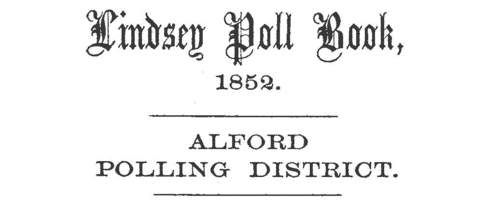
| North Lincolnshire Voters: Barton upon Humber
(1852)
The Poll Book for North Lincolnshire (Lindsey) in the General Election of 1852 was prepared from the poll clerks' lists, and so is arranged polling district by polling district, and within those by township or parish, but with non-voters listed separately at the end of each polling district. The 9,620 voters are listed not by residence, but by the parish or township in which lay the property that gave the right to vote: consequently 260 electors appear twice on the register. 1,797 did not vote. Many of the electors lived outside the area, or even outside the county. The names are listed roughly alphabetically by surname, with christian name, residence and occupation: with a key to the nature of their property (freehold fr, rented rt, or copyhold ch), and for whom the votes were cast (CR.: Rt. Hon. R. A. Christopher, who received 5,585 votes; CH.: Sir Montague J. Cholmeley, 4,777; S.: James Banks Stanhope, 5,575). Each elector had two votes. The franchise comprised all adult males in possession of 40s freehold, or £10 copyhold or leasehold, annual value.HUNTSMAN. Cost: £6.00.  | Sample scan, click to enlarge
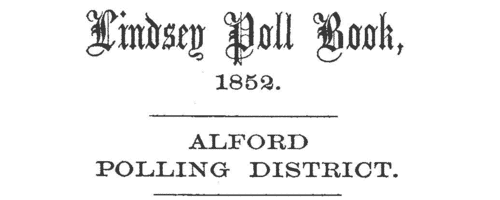
|
| 1 | 2 |  |
Research your ancestry, family history, genealogy and one-name study by direct access to original records and archives indexed by surname.
|













